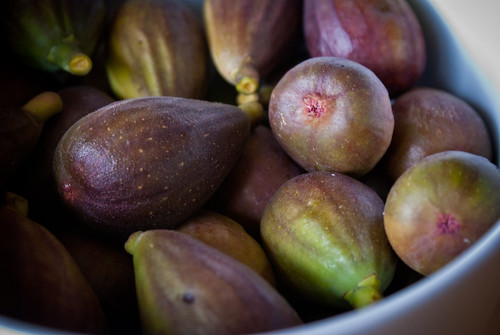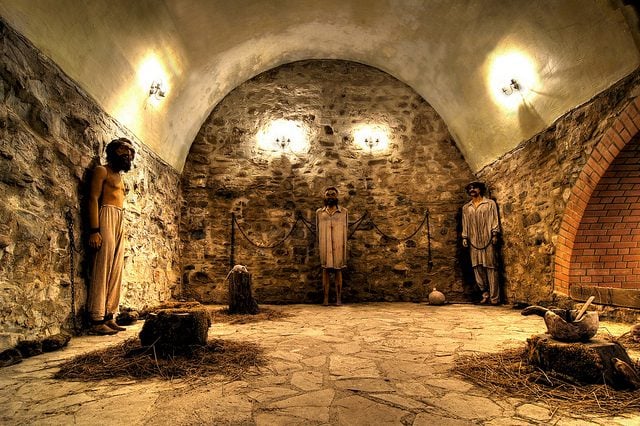
Lent 3C — Luke 13:1-9, 1 Cor. 10:1-13, Exodus 3:1-15
It doesn’t take much effort these days to bump into tragedy. You don’t have to look very far to see bad news. As a former journalist, I can attest that the old adage is true: if it bleeds, it leads. In our information age, we are more aware of the bad stuff in the world than ever.
The list of bad news is long: strife and conflict overseas in Iran, Syria and Afghanistan. The sequester in Congress. Hunger around the world that kills millions of children each year around the world. Closer to home, a school shooting in Connecticut and the deaths of innocent children in an elementary school.
And these are only the public tragedies in our world. They speak nothing of the personal tragedies we all experience and are weighed down by, that keep us awake and haunt as at night.
It is easy when we turn on the news to ask ourselves, “Why?” or maybe even, “Why God?”
Why those innocent children in an elementary school? Why God? Why does everything in this world, sometimes, feel so God-forsaken?
It is the same question the townspeople in our story ask Jesus. It seems Herod had yet again slaughtered religious pilgrims, slaughtered them while they were making sacrifices to God. Horrific wouldn’t begin to describe it. It was sacrareligious. And before we begin to count ourselves lucky that we have progressed enough in the past 2000 years that no one in our modern world would dream of slaughtering a group of immigrants while worshipping, perhaps we should remember those who died at the Sikh temple just a few months ago.
These questions are our questions. We have had our own falling towers just as they did in the first century.
Why? they ask. Why? we ask.
Now, in the first century, most people believed that when tragedy struck it was a punishment, a warning, the judgement of God. They believed that good things happened to good people. And when bad things happened, it was a reflection of your character.
Those Galileans that Herod slaughtered? They must have sinned something terrible. Those who died in the tower? They must have angered God. This was the conventional wisdom of the day, and we are not so far removed from this line of thinking in our own modern culture. Those children slaughtered? We had voices that told us it was because we’ve turned away from God, because we’ve banned prayer in schools, because we’ve let people own guns, because we’ve let our children play video games. Those towers fell in New York City? It was God’s judgement on a corrupt nation. We must have angered God.
And so these voices spray blame around in the face of tragedy in order to avoid dealing with it. Tragedy is much easier to stomach when there is someone to blame. So they call on us to repent, to be better people, so that maybe next time we can prevent tragedy, maybe next time God won’t get so mad, maybe next time we can control the uncertainties in our world.
Jesus in this story, too, calls us to repent. But for something different.
He calls us to repent of the belief that God is a God who sends violence, tragedy and death upon those who have sinned. He calls us to repent of making God into a monstrosity whose anger burns white hot at our mistakes and missteps. He calls us to repent of believing that God repays evil with evil, violence for sin.
God is not so petty and small a god as to do that.
In our lives, though, we want a God who takes that kind of vengeance. We want a God who gets even. We want a God who triumphs over enemies.
We don’t want a God who washes feet. We don’t want a God who loves enemies. We don’t want a God who, instead of getting even, stretches out on a cross to be executed.
So, as the people are asking Jesus whether tragedy is God’s judgement, Jesus in response tells them a story about who God really is. He tells a story about a vineyard owner, a fig tree and a gardener.
See this fig tree, it wasn’t doing what it was supposed to do. Fig trees are supposed to produce figs, but this tree wasn’t. It wasn’t following the rules of a fig tree. And so the vineyard owner comes in, angry at the tree for its lack of production, and calls for it to be completely uprooted, chopped up and used for firewood. It was good for nothing. It did nothing but take up space, take nutrients from the soil and waste them, take up the vineyard owner’s time. It wasn’t doing what it was supposed to do, and the vineyard owner was tired of all the taking. He wanted some making. He needed a fig tree that was a maker, not a taker. But the fig tree is saved by an unconventional gardener.
The problem is, though, we still view this story and God through the lens of the vineyard owner, through the lens of a God who punishes us for not doing what we are supposed to do, who sends tragedy and calamity our way when we mess up. We think that God is the vineyard owner, angry at our sin, our lack of production, our lack of fruit. And we see Jesus as the gardener, standing between us an abusive father’s rage, saying, give them one more chance, one more year to get their stuff together.
And we miss the point. God is not the vineyard owner. No, the vineyard owner is the wisdom of the world. It is the wisdom of the world that measures our value in how good we are, if we are following all the rules, if we are doing what we are supposed to. It is the wisdom of the world that says that our value is in how much we produce for the vineyard owner, how much profit we can make for the person in charge, how much we can put out for families, our churches, or communities. It is the wisdom of the world that says if you are not a maker, then you are a taker and good for nothing.
The wisdom of the world lionizes and value competency and success. It doesn’t value suffering or pain or failure or falling apart. It doesn’t value lament. It considers weeping a weakness. When tragedy happens, it wants to fix it and if it can’t fix it, it wants to find someone to blame. When grief happens, it wants us to get over it and move on. When it sees us fall, it tells us to get right back up and try, try again. It admonishes us that when the going gets tough, the tough get going. And if you don’t get back up and if you don’t get going, then you are good-for-nothing.
It is the wisdom of the world that sees such a vulnerable tree and demands that it be uprooted and throw into the fire.
Thanks be to God that God is not the vineyard owner. Rather, God is the gardener. God is the gardener who says no to the wisdom of the world. God is the gardener whose love rejects the wisdom of the world. God is the gardener who proclaims our value not in terms of whether we are doing what we are supposed to be doing, not in terms of what we produce, what we make or even what we take. God the gardener tells us, “All that doesn’t matter. I don’t care about all that. What matters is how much I care.”
And God says I care so much that not only am I not going to send punishment down on your for missteps, not only am I not going to uproot you when life seems to have sapped the life from you, but I am also going to get down there with you, in the dirt, in the manure, in the places where it smells and stinks and gets overwhelming.
God says, “I care enough to get dirty!”
And so Jesus is saying, in the midst of news of tragedy, don’t look to place blame on the victims of violence, the victims of hunger, the victims of poverty, the victims of grief, the victims of suffering. Don’t try to explain away tragedy by finding a convenient place to put the blame for it. And don’t put it on God. Don’t look for tragedy and trauma as evidence of the vineyard owner who has come and gotten even, offered retribution for wrongdoing.
Amid tragedy, if you want to find God, look where the suffering is. God is there suffering with us. This is the message of the Incarnation. That God is with us. So don’t look at the heavens and shake your first. Look at the dirt. And the manure. The earth. And dig you hands in. For that is where God is, with us in the midst of it all. In this parable, Jesus is telling us that God, when we feel most lifeless and hopeless and worthless, isn’t going to leave or forsake us or send us to the fires. Rather, God is entering into our lifelessness, hopelessness and worthlessness with compassion and love.
God will see us and not want to rid the land of such wastefulness. Rather God will see us and start getting dirty, smelling to high heaven, amid the crap that life throws at us, piles on us, shovels on us. And God is working. With us. Tending the soil. Creating life, from lifelessness. Creating life with us in the midst of manure, waste and dead things.
Jesus calls us to repent of our image that sees God as a vineyard owner who sows and reaps tragedy when we mess up. And he calls us to be gardeners, too. He calls us to follow him, to dig into the soil and the manure of what life can throw at people, to care about them, love them and stand with them. Repent not by saying your sorry. Repent not by saying all the right words. Repent by standing with those who are suffering, stagnant or stuck. Not to save them, or make their lives better, but to enter into their reality with them. God doesn’t want us to have the answer to suffering. God doesn’t want us to be the solution to suffering. God wants us to do exactly what Jesus did with us: to enter into the suffering of others and suffer with them.
See because as Paul tells the Corinthians, there is no suffering, no testing that we cannot endure. But it’s not that God will magically zap us with the pluck to pick ourselves up and keep walking.Rather the strength comes from knowing that we are God’s beloved. We are God’s ongoing story in the world. The strength comes from knowing, as Paul says, that there is no testing that is not common to us all.
The strength comes from not being alone. The strength comes from us. This community. This church. If it all seems like too much, don’t look toward the heavens for God or for the strength to keep going. Look around in these pews. God is here already. The strength comes from this great cloud of witnesses who have walked through the valley of the shadow of death and, if you need us to, who will through the valley with you. The strength to endure comes from each other.
When we bear burdens, together.
When we join hands, together.
When we get dirty, together.
When we sow new life, together.
_________
Subscribe e-mail and receive posts directly to your inbox











